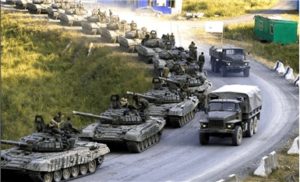Peace On Earth, Goodwill To Humankind
 Those lyric lines filled the atmosphere of the Starbucks patron seating area. Under present conditions such language seems to be the apex of irony. On a two hour zoom call yesterday President Biden is reported to have ‘warned’ Putin of Russia that if he attacks Ukraine, he will be sorry… And so goes the hoary macabre dance-of-death, exchange of threats verbal and material, — in the form of massed Russian troops and equipment at the border with Ukraine.
Those lyric lines filled the atmosphere of the Starbucks patron seating area. Under present conditions such language seems to be the apex of irony. On a two hour zoom call yesterday President Biden is reported to have ‘warned’ Putin of Russia that if he attacks Ukraine, he will be sorry… And so goes the hoary macabre dance-of-death, exchange of threats verbal and material, — in the form of massed Russian troops and equipment at the border with Ukraine.
A brief conversation was had last night with a friend about a topic that has come up more than once. By what right does anyone claim possession, exclusive ownership of a segment of the earth… ?
I was surprised and delighted to read that Immanuel Kant (1724 – 1804) had written an essay about this topic in the 18th century. Kant entitled his essay ‘Perpetual Peace.‘ In an essay entitled Where the Wild Things Are, German scholar Byung-chul Han responded to what Kant wrote in ‘Perpetual Peace.’
A few quotations follow from what Han had to say in his book Capitalism and the death drive.
Kant’s famous essay ‘Perpetual Peace’ is extraordinary and especially relevant today. His plea on behalf of reason has lost nothing of its significance. Enlightenment, guided by reason, is still a work in progress.
For Kant, attempts to justify war, even if hypocritical, are already proof ‘that man possesses a greater moral capacity, still dormant at present, to overcome eventually the evil principle within him’ because ‘otherwise the word right would never be used by states which intend to make war on one another.’
According to Kant, ‘no one originally has any greater right than anyone else to occupy any particular portion of the earth.’
The pursuit of self-interest may be rational, but it is not reasonable. It is not moral. Those who are guided by their self-interest are not acting according to ‘motives of morality.’ Self-interest is a human ‘inclination’ that must be overcome in favor of reason. Following our inclinations makes us unfree.
In a certain sense, morality is blind, therein lines its incorruptible power, its humanity.
The world has become one gigantic department store. Would the EU, the European department store, open its doors to refugees? Refugees probably have no rightful place in a department store.
Today, morality and politics come apart, because politics does not submit itself to the laws of reason but only to economic compulsion. The economy is not a category of reason. In the economic sphere, morality gives way to a ‘general doctrine of expediency’, a ‘theory of the maxims by which one might select the most useful means of furthering one’s own advantage.’ And this amounts to a denial ‘that morality exists.’
Happy Holidays !
2 thoughts on “Peace On Earth, Goodwill To Humankind”
To add a small bit to this topic I would like to include one of the pieces of writing from 36 Acres:
The Borrowers
The concept of owning land is odd. If anything, we, as transient beings, are borrowing the land. The Earth was here well before Homo sapiens emerged from the tangled web of evolution and it will be here well after we have passed through the membrane of existence.
But our consciousness truly is Eden’s apple, for in the complex realm of our firing neurons there are many different paths that we can choose. So during my all too brief life on this earth I would like to walk the path taken by many others; to feel the soil beneath my feet, to revel in nature’s ever-changing wonder, and to do what I can, within the course of human culture, to minimize the scars we all leave upon the face of our only home.
Though there are times I lose track of this goal, when I put aside the future and rationalize the present, only to be faced with the potentially devastating consequences of my own behavior. In the end, my hope is that the generations who follow will forgive us for our indiscretions and that they will have the knowledge and wisdom to survive the sins of their fathers.